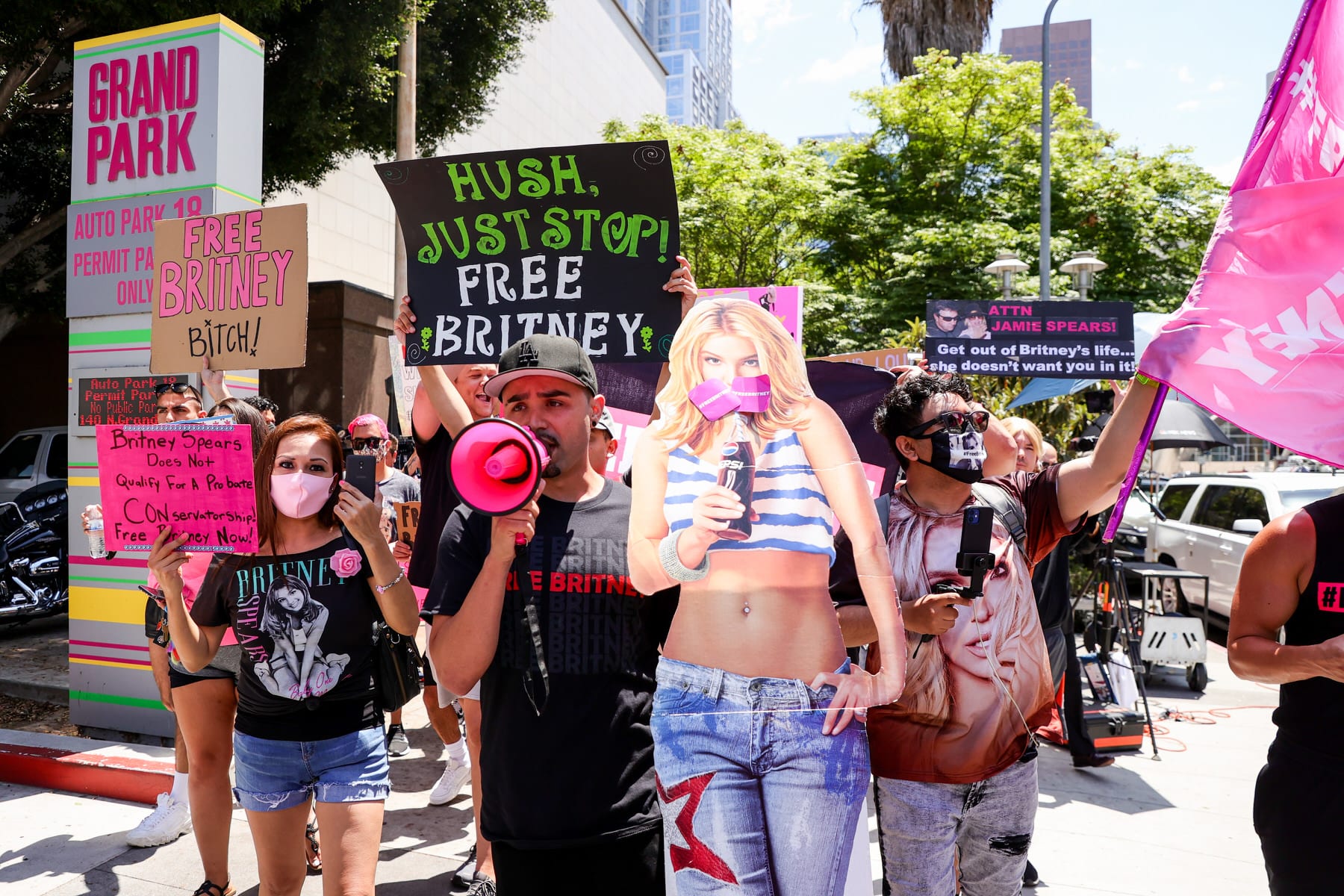The continuing proceedings surrounding Britney Spears’ conservatorship case mean that once again, more Americans are learning about the very idea of conservatorship itself, and the ways it is applied to those with mental illness or disability.
The latest developments came this week when Judge Brenda Penny signed off on documents approving Bessemer Trust, a financial company, to the role of co-conservator of Spears, while also maintaining her father, Jamie Spears, as the pop icon’s other co-conservator. These latest legal proceedings are not connected to Spears’ recent testimony asking for her conservatorship to end, but do re-affirm her father in his conservator role even after that testimony. Bessemer Trust asked on Thursday to be released from the arrangement, citing Spears’ publicized plea.
The case has drawn widespread attention, but for advocates who have worked with the 1.3 million Americans living under conservatorship, it is in some ways “not surprising and frustrating” that Spears’ testimony has been viewed as an anomaly.
“People are saying, ‘This is terrible that Britney is subjected to this.’ But I would say, ‘It’s rather terrible that we subject a lot of the people we subject to this,’” Kathy Flaherty, the executive director of the Connecticut Legal Rights Project (CLRP) — which provides legal assistance for people who are eligible for state-run mental health services in Connecticut, including many people in in-patient, state-run psychiatric facilities.
“I think people have to really look at how we allow the law to control people’s lives,” she added.
Flaherty believes that inherent in this conversation is a seemingly contradictory belief about how many Americans view government intervention in the lives of its citizens generally versus how they believe that same philosophy extends to those with mental illness.
“So many people are in a rush to claim that the government shouldn’t do this or that or anything that would interfere with people’s lives and freedoms, but it seems to be OK to do when we’re talking about a person with a disability,” she said. And Flaherty said the situation seems to escalate when discussing mental health specifically: “There, you’re forcing people into treatment, forcing people to be admitted to a hospital, and keeping someone locked up in there.”
For Flaherty, the issue is personal. During her first year of law school, she was civilly committed and held in an in-patient facility for two months. “I was injected with medication I didn’t want, secluded, sedated, restrained. None of that is fun,” Flaherty said. “The fact that I still think about all of this 30 years later — it doesn’t go away. It provides motivation for a career, but it doesn’t go away.”
Flaherty said she hopes that Spears’ case brings to light that in many cases, lawyers may not be fully attentive to their clients’ wishes.
She stressed that while sometimes a conservatorship may be the “the only way to address what’s going on” in regards to a person with mental illness or disability, there are other mechanisms that should often be explored first. Flaherty noted that people can draw up legal documents outlining advance directives for their health care, appointing health care representatives and creating agreements showing that you have a team to help support you in making decisions.
“These things maximize people’s ability to control their own lives,” she said. “And if you’re taking them away, they should be reviewed. And if they’re not necessary to begin with, then they shouldn’t be kept in place.”
One thing that is incredibly unique about Spears’ case within the context of conservatorship cases at large is how much money her estate encompasses. As a result, Flaherty said, it is important to remember that “people are getting paid in Britney Spears’ case, and whenever someone is getting paid, look at what people are incentivized to do.”
The majority of Flaherty’s clients do not have such wealth. Flaherty says court-appointed conservators often take on a large number of cases since they receive a flat fee for each of these from the court. The consequences of those high caseloads, she suggested, could be adverse for the people in conservatorship like the clients she serves.
“Depending on how cynical I feel on a given day, I think they’re working exactly as they’re intended because they are benefitting people who already have power,” Flaherty said.
Sometimes, these lawyers also fail to remember what it means to work for a client who has had a conservatorship petition filed against them.
“Their job is to be a zealous advocate for that person’s expressed preferences,” she said. “It’s not their job to be their guardian and look out for their best interest, but to advocate for what the client wants and let the judge make his or her decision” about whether the burden of proof has been met for implementing a conservatorship.
Alex Barnard, an assistant professor of sociology at New York University whose research focuses on mental health policy and inequities — and specifically around mental health conservatorships in California, where the pop star lives — agreed that Spears’ case was unusual, especially for the state. In California, he said, conservatorships aren’t typically applied until a person “has done nothing less than almost dying.” Typically, a mental health conservatorship — which is what was originally applied to Spears in 2008 before she was transitioned to a conservatorship through the probate court system — is granted only after it is proven that a person cannot provide food, clothing or shelter for themselves.
“If you can occasionally figure out how to get to a soup kitchen, that meets the need for food,” he said. “If you can figure out a place to sleep under the highway, that meets the standard for shelter. We typically wait a very, very long time and for people to be in a very bad place to be put into conservatorships.”
Barnard said he was worried that Spears’ case “distorts” this reality that most Californians are facing when it takes so much for many people with disabilities to qualify for any kind of social net services, even if that is only under the auspices of conservatorship.
Even more crucial, Barnard said, is to recognize conservatorships other than Spears’ reflect how the “the health system is failing” those who are struggling and not the legal system. Through this lens, it’s also apparent how many, many people are really struggling.
“You could add more legal protections to make it harder to get conservatorships granted or easier for conservatorships to be granted, but all that really points to is not having a robust mental health system offering intense and voluntary services,” he said. “Whether that’s through hospitals or residential treatment, we need to think about this on the front end about how to best help people so that the only option isn’t to curtail their rights and throw them in a locked facility.”
Unlike in Spears’ case, economic status is typically the largest barrier to getting these kinds of front-end services that can circumvent the need for conservatorship altogether, Barnard said. Those with means have the ability to pay for weekly psychiatric therapy out of pocket — psychiatry is less likely to accept insurance than other types of medicine — and have a work schedule that allows for making weekly sessions and reliable transportation to get to and from those appointments.
“But a poor person on Medicaid with schizophrenia is going to have to navigate an extremely convoluted system that will have you waiting months to see a psychiatrist even once,” he said.
Further compounding the issue is the way that race intersects with economics; Barnard pointed to research suggesting that people of color are less likely to get a call back from a mental health professional after first initiating contact for care. Additionally, involuntary mental health holds are commonly instigated by police who get called in and make the call that someone is dangerous to themself or others, and “there are huge racial disparities in this” form of policing.
When discussing conservatorships, both Barnard and Flaherty mentioned that most often they heard about cases involving Black men, partly because of the systemic issues that flagged them for oversight. But there is no national database on people placed in such arrangements.
Barnard said he is concerned that absent Britney Spears, “a lot of people on mental health conservatorships in California are sadly people who no one cares about.”
“The Britney case is simple,” Barnard said. “She should get off of [her conservatorship] and would probably be OK after that. She might make some decisions that are bad, but she is quite competent to live her life and make these decisions.”
But for many people in California specifically who find themselves in conservatorships, the situation is much more complicated, Barnard said.
“A lot of people on conservatorships were homeless prior to their conservatorship. So are they going to be homeless after their conservatorship? If we sever them from the court, what services will they have left?”
He emphasized that a “focus on intensive voluntary outpatient services plus permanent supportive housing integrated into the community” could be a solution for many. But he also noted that some people currently on conservatorships may still need something more structured than that.
“A lot of people are currently in locked facilities, so what are the step-down programs that would move someone towards independence in a more deliberate fashion than just saying, ‘We will put you in this apartment and offer you services but you can say no to them.’ Some people may thrive, but some people may struggle.”
The ironic thing remains that all of these interventions are seemingly designed to help those already, in some way, struggling or marginalized, yet too often set them up for even greater challenges afterwards while failing to meaningfully intervene in their struggles before.
“I don’t think people think about the impact of things we do to people ‘for their own good’ and that these things can be really harmful,” Flaherty said. “When Britney Spears expressed that she felt like her lawyer wasn’t listening to her and she wasn’t sure what was going on with her own case, that’s not uncommon. A lot of times, clients tell us, ‘You’re the first person who ever listened to me.’”







